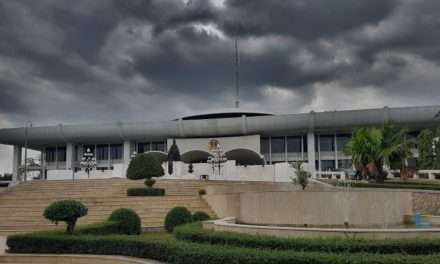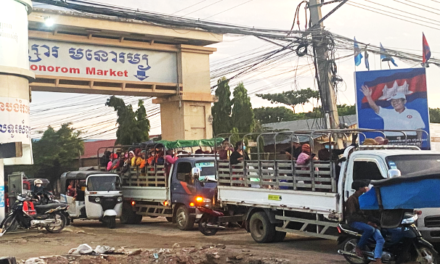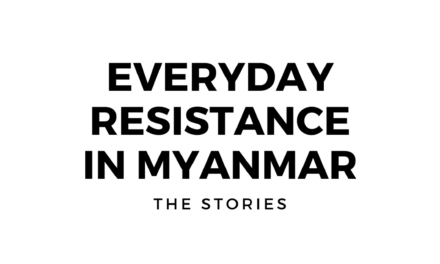By Chanida Chanyapate and Isabelle Delforge*
Thailand’s ambition to become the "kitchen of the world" has suffered a severe public relations setback. Just as the government launched the 2004 food safety year aimed at increasing the quality and reputation of Thai produce, more than 20,000 tonnes of poultry were being shipped back to the country after being rejected from Japan, Europe, and South Korea.
Thailand, like many other countries in the region, is reeling from what the World Health Organisation (WHO) called an unprecedented outbreak of bird flu, spreading like wildfire across Asia. The pandemic, which probably originated in China at the end of 2003, (1) has already resulted in the loss of more than100 million poultry in South Korea, China, Hong Kong, Indonesia, Thailand, Laos, Cambodia and Pakistan.
More worrisome for the world health authorities, the deadly virus has jumped from its avian host to infect humans. According to the WHO, by mid-March, 34 people had been infected in Thailand and Vietnam, among whom 23 had died, 12 in Thailand. So far, most of the people affected have been in direct contact with sick animals and the fear that the virus could mutate and be transmitted from human to human has not materialised. Yet the WHO is extremely worried, and warns that the consequences of such pandemic for human health around the world could be devastating.
CHICKEN DISEASE, NATIONAL CRISIS
In Thailand, the avian flu quickly became a national crisis, first of all because chicken is big business. In 2003, Thailand was the 4th largest poultry exporter in the world, selling 540,000 tonnes abroad for 1.2 billion dollars. Up to 90% of the nation’s chicken production is exported, mainly to the European Union and Japan. (2) Chicken production, feed and processing represent such an important industrial sector that the total damage of the bird flu to the industry has been estimated at over 30 million baht (US$763,000). Tripol Jawjit, an opposition politician said that 670,000 farm families were suffering as a result of the bird flu. (3)
Yet if the epidemic has extended its wings far beyond chickens and ducks, it is mainly because the leader of the market is also Thailand’s largest corporate empire. Charoen Pokphand Group (CP Group) is a multinational conglomerate employing 100,000 people in 20 countries worldwide. Its core business is food production, but its activities stretch from seeds to telecoms, and from feed to the franchise of Seven-Eleven retail shops.
It is Asia number one poultry’s exporter and, in many cases, controls the whole production chain, from feed to retail sales of processed chicken. Feed, and more specifically hybrid seed corn production, is the most lucrative part of this vertically integrated business. (4) According to Viroj Na Ranong, a researcher at the Thailand Development Research Institute "It is the poultry business that made CP well known in Thailand. In the seventies, the company entered the market with new breeds and the contract farming system inspired by its US partner Arbor Acres. As a result, chicken became the cheapest meat in the market. It changed people’s eating habits and backyard poultry disappeared." (5)
Even though its chicken operations account for only10% of the CP Group’s revenue, the avian flu hit the whole economic empire. The day after the Thai government officially recognised the outbreak of the virus, CP’s stock plummeted by 12.5% and the Stock Exchange of Thailand index fell sharply. In Thailand, when CP sneezes, the whole business community catches cold or, in this case, flu.
FLU BECOMES A POLITICAL CRISIS
But far beyond the devastating economic impact of the epidemic, the bird flu shook the whole country as it evolved into a month-long political crisis. From the beginning, Prime Minister Thaksin Shinawatra, who is also one of the richest businessmen in the country, handled the whole affair in such an untransparent way and supported national industry so blatantly that Thai consumers started to feel cheated. Not only were they reluctant to eat Thai chicken, but they were also starting to doubt what their Prime Minister was saying. This crisis of confidence was shared by some of Thailand’s major commercial partners, including the European Union and Japan.
The story of the avian flu outbreak in Thailand reveals how agribusiness, and CP in particular, managed to influence the political leaders to make sure that the government defended the interests of the export industry before protecting consumers and producers rights.
The government handling of the bird flu is a saga of cover-ups, incompetence, lies and extremely questionable decisions: the long delay before admitting the existence of the bird flu both in animals and in humans, the selective measures taken to stop the spread of the epidemic and, most spectacularly, the massive public relations campaigns to convince Thai citizens that eating chicken was nothing less than a patriotic act.
ACCUSATIONS OF COVER-UP
Following two months of denials and accusations of a cover-up, the government finally admitted the presence of the disease in the country on January 23, 2004. It only did so after being publicly challenged by several civil society organisations and opposition senators to disclose the truth. Many sources confirm that the industry and the government knew that the epidemic was raging as far back as November 2003.
A veterinarian at Chulalongkorn University said that he had found the H5N1 virus, the scientific identification of avian flu, in chicken carcasses from Nakhon Sawan in November and had informed Livestock Department chief Yukol Limlamthong about the avian flu outbreak. But no action was taken. (6) Disathat Rojanalak, an organic farmer at Nong Chok near Bangkok explained that his chicken started to die in December. When he brought the carcasses to the Department, he was told that his chickens were dying "without any medical cause". As 350 birds had died in a few days, he sensed that the laboratory was not telling the truth. (7) A group of women workers and members of the trade union at Centaco factory in Rangsit (near Bangkok) explained that from November to January 23, they were asked to work much more overtime than usual. "Before November, we were processing about 90,000 chickens a day. But from November to January 23, we had to kill about 130.000 chickens every day." They saw many diseased chickens arriving in the factory and were ordered to process them, even if they had already died from the illness. "We didn’t know what the disease was, but we understood that the management was rushing to process the chicken before getting any veterinary inspection. Now, there is not enough chicken. We process around 60,000 or 70,000 a day, we don’t have enough work anymore." (8)
Several government officials and CP executives admitted that special measures had been taken in factories since November, but they said that they believed it was a cholera epidemic. According to professionals, however, chickens affected by cholera present different symptoms.
One of the strongest reactions to the government cover-up came from the European Union’s health commissioner, David Bryne, who visited Thailand in January. The Prime Minister and the Ministry of Agriculture had reassured him that Thailand was definitely free from the disease only a few days before announcing that bird flu cases had been found. David Bryne felt "dishonoured" and got even more upset when he learned that the government had covered-up the outbreak for fear of causing public panic. (9)
The Manager, a national magazine, accused the government of keeping the crisis secret to protect the interests of large poultry firms. Instead of quarantining the areas where bird flu was first detected, the magazine reported, officials collected money from the private poultry companies and handed it out to the farmers with infected birds (40 baht per chicken, about 1 US$). Farmers said that they were receiving this small compensation in exchange of keeping their mouth shut. Later, in the restocking scheme, industry leaders were trying to sell laying chickens at 120 baht each. (10) Because of the spread of the disease in Asia, the price of frozen chicken on the global market rose from 1,600 to 2,500 dollars a tonne during November and December. According to the Manager, this was an excellent business opportunity for the Thai poultry industry which, at that time, was still considered healthy on the global market. (11)
Other dismaying news came up in the press when the Thai authorities started to implement emergency measures to contain the disease. When the avian flu was detected, a "red zone" was declared around the farm and all the poultry in the zone were killed to prevent the spread of the disease. However, some farmers reported dead chickens but no red zone was declared around their property. They suspected the authorities of protecting neighbouring industrial farms or owners of highly valuable fighting cocks. (12)
There were also concerns that the "red zones" were lifted too quickly without being sure that the disease was eradicated. In mid-February, the WHO described as "premature" Thailand’s lifting of quarantine restrictions. (13)
Many observers concluded that the outbreak of the avian flu in Thailand would have been much less devastating if appropriate measures had been taken from the beginning.
EATING CHICKEN, A PATRIOTIC ACT
The government’s support to the poultry industry took a very public turn when Prime Minister Thaksin engaged in a personal crusade to convince Thai people to go back to their favourite chicken dishes. In February, it was rare to see him in the media without a chicken leg between his teeth or getting ready for a lavish chicken meal. The authorities intended to restore public confidence in Thai chicken and to resume exports. Massive advertising boards with a hand-written sentence signed by the Governor of Bangkok: "If Thais don’t eat Thai chicken, how can we expect others to buy our chicken?"
The campaign reached its peak at the "chicken festival" put on by the government in Bangkok on February 8 which featured CP and other industry giants distributing thousands of free chicken dishes, a chicken eating competition, and pop stars and politicians parading showing their eagerness to eat Thai chicken.
But the results of this propaganda campaign were meagre. After months of rumours and the continuous lack of information about the risks and the spread of the disease, Thai consumers remained sceptical. Many restaurants stopped serving chicken and the fast food chains specialising in chicken were deserted. Luckana Naviroj, executive director of the Mall Group, said that in the weeks after the outbreak of the bird flu crisis, sales of chicken had fallen by 50% while sales of eggs were down by 70%. (14)
KITCHEN OF THE WORLD DOES NOT FEED EVERYONE
The chicken patriotism promoted by the government is riddled with contradictions. For example, people were encouraged to eat at Kentucky Fried Chicken’s outlets, where the chicken was supposedly safe because it was produced by CP and properly cooked. It is ironic that in a global capitalist era, the US fast-food chain KFC became a Thai icon.
But the contradictions were more fundamental. The government’s handling of the bird flu crisis showed that the authorities considered the interests of the export industry as the nation’s priority. Yet, most people in Thailand are not benefiting from this extremely successful business.
First of all, workers and consumers’ health clearly come after exporters’ wealth. The government’s spectacular attempts to restore public confidence in Thai chicken were unmatched by similar efforts to inform consumers and the people with high risk of exposure to the avian flu virus. The World Health Organisation even slammed the government for providing inadequate health protection for poultry farmers, veterinarians and people involved in the mass slaughter of animals in bird flu areas. (15)
Ms Kulnipa Panton, president of the trade union at Centaco processing factory in Rangsit said, "When the government announced the bird flu on television, we asked the management to increase our safety. We asked for protective gear and we got it. But it is not enough. We run more risks than farmers because we have no choice but to touch chickens all day; we touch the blood, we touch the feathers." They had been killing and processing diseased chicken for more than two months without any special protection.
Small farmers were the first ones to be hit by the virus. Most of the human victims of the avian flu in Thailand were chicken raisers in rural areas. Small-scale poultry farmers complained that they did not have access to reliable information about the disease and the way to avoid infection. This argument became particularly emotional when the mother of a 6 year old boy who died from the virus bitterly invited the Prime Minister and his cabinet to eat chicken in her village, saying they would pay anyone who died from eating their chicken 10 million baht, mocking the government’s own campaign promise. Similarly, consumers’ organisations blamed the government for spreading a reassuring message while the dangers were actually severe. (16)
EXPORT AGRICULTURE: PRODUCING MORE FOR LESS
There is the strong belief that exporting more will benefit the whole nation. Far from being a Thai speciality, however, this belief is a pillar of the neoliberal thinking which has dominated economics for two decades. But Thailand’s experience shows that not everyone benefits. Over the past 20 years, the country has become an extremely successful food exporter and, according to the WTO, ranked fifth in the world in 2001. But at the same time, food producers have seen their incomes shrinking, their debts exploding and the environment devastated by chemicals and overuse.
While the value of food exports increased by 52 % between 1995 and 2000, the average debt per farming household increased by 51%, (from 24,672 baht/US$623 to 37,231 baht/US$941) and the number of indebted households had reached 3,379,163. (17) Thailand’s farmers are producing more for less. Instead of benefiting farmers and workers, trade liberalisation in the farming sector has benefited traders, brokers and agri-business giants.
Charoen Popkhand Group has the ambition to become "the kitchen of the world"– a mission that has been taken over by the government for the whole country. The bird flu crisis revealed that this commercial goal leads to an extremely dangerous blurring between the interests of the nation and the profits of the export industry.
* Chanida Chanyapate Bamford is deputy director of Focus on the Global South and Isabelle Delforge is a researcher.
NOTES
1. According to the WHO, the pandemic started in South Korea in December, however "New Scientist" said experts had said that the outbreak probably began a few month later in China.
2. According the Thai Broiler Association
3. Bangkok Post, February 6, 2004
4. Interview with Mr. Anek Silapapun, vice president of Crop Integration Business Group, affiliated to C.P. Group, June 20, 2003
5. Interview, Bangkok, June 19, 2003
6. Bangkok Post, January 30, 2004
7. Interview March 19, 2004
8. Interview with a factory union leader on March 20, 2004
9. Bangkok Post, February 5, 2004
10. Bangkok Post, March 25, 2004
11. The Manager, February 2, 2004
12. Bangkok Post, March 11, 2004









